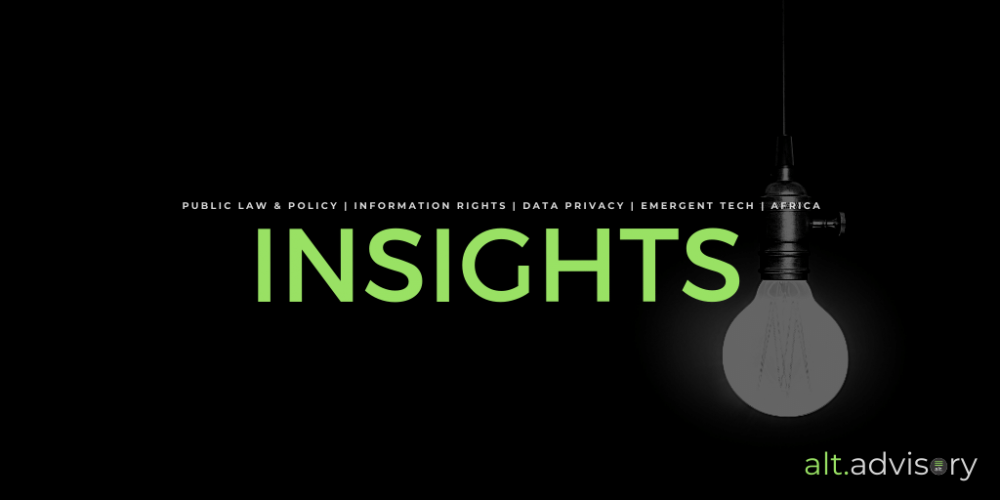Democracy 2.0: Digital voting systems
ABSTRACT
E-voting requires a careful balancing act and continuous transparency by public institutions. Broad and accessible consultations with various stakeholders and extensive public engagement are necessary should South Africa consider e‑voting.
KEYWORDS
Democracy – digital voting systems – electronic voting – elections – electoral fraud – public trust – right to vote
INTRODUCTION
The COVID-19 pandemic has forced us to reassess most, if not all, aspects of how our society functions. It has cast a spotlight on the ability of public and private institutions to adapt. Naturally, the build-up to the local government elections in South Africa — set to take place on 27 October 2021 — has raised questions about the feasibility of in-person elections, particularly whether a balance can be struck between the implementation of adequate health protocols and maintaining necessary oversight to ensure that the election is free and fair.
Discussions concerning the introduction of digital voting or electronic voting (e-voting) in South Africa are still relatively new, however, they elicit polarising views.
This issue of Democracy 2.0 focuses on the concerns which have been raised regarding e-voting in South Africa, and it provides comparative guidance from other jurisdictions. Further, arguments in favour of and against e-voting, and the impact it may have on our democracy, are presented.
// “The right to vote is foundational to a democratic system. Without it, there can be no democracy at all.” – Constitutional Court in the New National Party judgment.
IS SOUTH AFRICA READY FOR E-VOTING?
In 2020, the Department of Home Affairs introduced the Electoral Laws Amendment Bill (Electoral Bill), which introduces provisions allowing the Independent Electoral Committee (IEC) to prescribe a ‘different’ method of voting for national, provincial, and local elections. As a result of the vague language used, the IEC essentially holds unilateral power to change the current voting system.
This has resulted in concerns that digital voting may be on the cards for South Africa in the near future. The proposed provisions were highly contested, with over 12 000 submissions made to Parliament by the public and other interested stakeholders.
Presently, section 38 of the Electoral Act 73 of 1998 and the Municipal Electoral Act 27 of 2000 set out the voting procedure: a voter presents their identity document to a designated voting officer, who confirms the voter’s identity and that their name appears on the voters’ roll. The voter’s hand is then marked in the prescribed manner and they are given the opportunity to cast their ballot paper in “hard-copy” into a sealed ballot box, after which they are required to leave the voting station without delay.
Broadly speaking, the recurring concerns raised in response to the proposal of e-voting include:
- Parliament is, in effect, delegating its constitutional authority and duty to decide voting procedures, through legislation, to the IEC.
- In light of the state of South Africa’s economy, the implementation of e-voting would be a costly exercise, as it would require the government to purchase resilient hardware and software to accommodate the entire voting population.
- From a security perspective, this system may be vulnerable to manipulation and could increase the probability of electoral fraud.
- E-voting has the potential to obstruct transparency. Without adequate verification processes, a legitimate concern with e-voting is that the outcome may be manipulated.
- The implications of e-voting on communities without access to digital technologies cannot be disregarded.
Despite some of these concerns, other jurisdictions have implemented digital voting systems, and their experiences can be instructive for South Africa.
Estonia
Estonia piloted internet voting (i‑voting) in 2005 for its national elections. In terms of i-voting, voters are requested to log onto the system using their ID-cards, however, the system maintains each voter’s anonymity once their vote reaches the Electoral Commission for tallying. Notably, voters are given the option of changing their votes. In 2017, Estonia reported that i‑voting had saved the country 11 000 working days.
The United States of America
In the early 2000s, the US Department of Defense authorised online voting trials to enable voting by military personnel stationed abroad. Today, the voting technologies used in America vary across different states. The experience of the USA is a reminder that e-voting is a broad concept which does not always refer to casting a ballot electronically — American voters may receive their ballots electronically through e-ballot delivery, fill them in manually, and post them to local election boards.
Brazil
With a population of over 200 million people, Brazil implemented e-voting technology in 1996. Using direct recording electronic machines (DRE) owned by the Superior Electoral Courts, voters select their preferred candidate’s number on a screen and hit a button to submit their vote. The Electoral Court is then tasked with tallying the results of each machine. For security purposes, the machines are not connected to the internet.
Germany
Following the 2005 elections, which saw two million German voters cast their ballots electronically, the German Constitutional Court ruled that the use of e-voting machines was unconstitutional. The ruling came as a result of two voters who argued that the technology which was used was not transparent to the public, who had to place “blind faith” in the system. The Court highlighted that when using e-voting, the results must be capable of being “…examined reliably and without specialist knowledge…”
// E-voting is a broad concept, which may encompass direct recording electronic voting machines, optical scanners, electronic ballot printers, and i-voting
HOW E-VOTING COULD ENHANCE OUR DEMOCRACY
The primary argument in favour of e-voting is efficiency. As Estonia has demonstrated, e-voting reduces the demand for manual labour and decreases the scope for human error during the electoral process, specifically during vote counting. Accelerated transmission means results may also be announced earlier. Further, e-voting has been shown to assist illiterate voters or differently-abled voters. By way of example, in the USA an audio interface may be made available to visually impaired voters. In the main, if properly implemented, e-voting could enhance the electoral experience and further enable the constitutional right to vote.
Should South Africa incorporate digital voting technologies in the future, a clear and comprehensive legal framework is necessary. Although there is a gap in international standards on e-voting technology, in 2004, the Council of Europe developed and adopted recommendations on standards of e-voting (updated in 2017). Some of the recommendations are:
- the electronic voting interface should be easy to understand and use;
- where e-voting and non-electronic voting channels are used during the same election, there should be a secure and reliable method to aggregate all votes;
- voters’ identification should be verifiable;
- the components of the e-voting system should be disclosed for verification and certification purposes; and
- only persons authorised by the electoral management body shall have access to the central infrastructure, servers, and election data.
HOW E-VOTING COULD IMPEDE OUR DEMOCRACY
The use of technology during elections does not offer easy solutions for dealing with corrupt officials and electoral authorities. The risk of manipulation by malicious actors, which may be politically motivated, is often associated with e-voting. Vote rigging has long been a threat in most countries, even in long-standing democracies, and it is not clear that e-voting presents simple solutions to these long-standing challenges. Although tried-and-tested security measures, such as decentralised blockchain-based systems, exist to address this, the public’s mistrust of the State’s potential to abuse e-voting mechanisms should not be disregarded. A lack of confidence in e-voting systems may manifest in the form of non-participation in voting or taking action which challenges the election results. This is where the need for effective voter education and multiparty support comes in.
It is important to remain cognisant of South Africa’s context related to digital technology. Even if security concerns are overcome, the internet user penetration in South Africa, in 2021, stands at 57.8 per cent. The implication, depending on the kind of measures implemented, is that voters in rural and underdeveloped regions may not have access to e-voting technologies to the extent that privileged segments of the population do.
The IEC has acknowledged that e-voting would require “huge public investment initially” — a lack of infrastructure and insufficient resources would render e‑voting in rural communities a difficult task. This begs the question of whether convenience and efficiency are only reserved for the middle class. Digital inequality is an ongoing issue in South Africa and, ironically, delayed service delivery in ensuring better internet access for all would stall the government’s plans to introduce e-voting and raise the prospect of equality challenges being raised. This brings to mind the words of Arthur Miller, “When the government goes into the business of destroying trust, it goes into the business of destroying itself.”
// “When the government goes into the business of destroying trust, it goes into the business of destroying itself.” – Arthur Miller
CONCLUSION
From the above, it is clear that e-voting requires a careful balancing act and continuous transparency by public institutions. Broad and accessible consultations with various stakeholders and extensive public engagement are necessary should South Africa consider e-voting. Pilot tests in conjunction with public information campaigns over an adequate period of time appears to be the most reasonable approach. Additionally, improved service delivery in underdeveloped areas cannot be divorced from this subject. Ultimately, the feasibility of digital elections is, to a large extent, dependent on the actions of the State to obtain buy-in from South Africans.
+ S’lindile is a Researcher // Analyst at ALT Advisory.
* Wendy is an Independent Consultant at ALT Advisory working on data protection and privacy.
^ Michael is a Director // Co-founder at ALT Advisory and the Practice Lead for Public Law & Emergent Technology.



